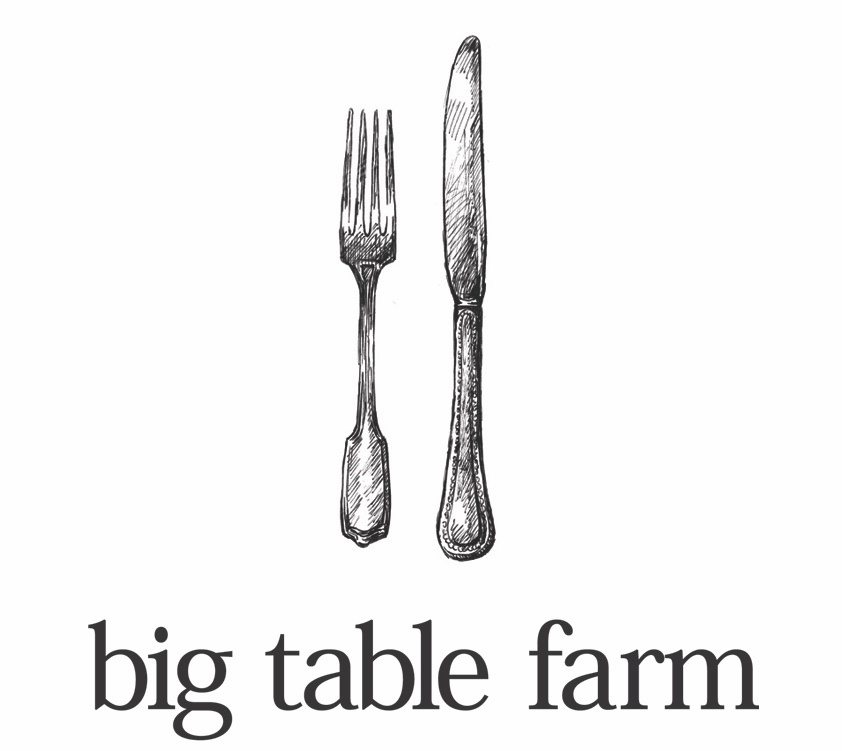Big Table Farm Converts Smoke into Biochar
Read the Oregonian article about our project ->
After 13 years farming and making wine here at big table farm in Gaston OR, Brian and I started preparing 13 acres of our farm to plant vineyard a year ago. As part of this process, we needed to reclaim our hillside, and there was only one solution readily available for dealing with all the brush, small fir trees and invasive scotch broom we took out. That was to get rid of the piles with an open burn. Burning brush is the most widely accepted ag solution for brush and wood 'waste' created when you are converting land from one ag use to another.
Brian had enough of an understanding of the damaging effects of open burn that he wanted a better alternative, so he and I got to work on finding a solution. This process has taken us a year of lots of research, talking to scientists, air curtain companies and other industry professionals. During this year we put our vineyard development on hold till we had a solution that fit our values. Now a year later we are excited and to announce the first on-site carbonization of cleared vegetation in an agricultural setting by a Carbonator 500. We are turning what would be just smoke and ash into trapped carbon.
Carbonization of the brush is a net negative carbon sequestration of the biomass at big table farm, compared the other alternative, which is an open burn.
As ag land in Oregon’s Willamette Valley transitions from tree farms to vineyards and orchards, Big Table Farm is pioneering a new way to capture carbon and nutrients from biomass to build farm soils all while keeping smoke and CO2 out of the atmosphere. Instead of burning big smoky piles, Big Table Farm will use the Carbonator 500 to cleanly convert the biomass into biochar, a persistent form of carbon that builds soil. The Carbonator burns smoke and other gases from waste wood to generate the heat that makes biochar with less oxygen than during burns. Turning smoke into biochar keeps carbon out of the atmosphere and returns it to the soil.
Big Table Farm has hired Blackwood Solutions to bring the Carbonator to the farm and start work on 13 acres worth of slash piles beginning the week of May 14, 2019. The work may take anywhere from 2 to 4 weeks to complete, depending on feedstock conditions like moisture and size. The process uses far less energy than other alternatives, such as grinding and trucking it to distant composting or energy facilities
Compared to a conventional burn pile, the carbonation traps, and emits less CO2 and other greenhouse gasses than burning, and carbonizes particulates instead of releasing them into the atmosphere. The Carbonator also converts the biomass into biochar by arresting the carbonization at a critical point sequestering carbon in the form of biochar that persists in soil for hundreds to thousands of years. Over our life time, it's a one-way trip for carbon that is pulled out of the atmosphere by a growing tree or shrub and ends up in the soil as biochar. Conventional burn piles leave behind nothing but smoke and ash.
This process is considered carbon negative when you factor in the biochar on top of the carbonation on the piles and compare it with burning. In the soil, biochar continues to provide soil benefits as it attracts and holds nutrients, water, and microbial life. Plant roots seek out biochar particles in soil to feed on the abundant nutrients held in biochar pores. Soil carbon continues to build, as plants remove even more carbon from the atmosphere.
For our lungs, and our planet, Big Table Farm is proud to initiate the first real solution for environmentally responsible handling of biomass clearing by partnering with blackwood solutions in this first large-scale farm-based biochar production project.
